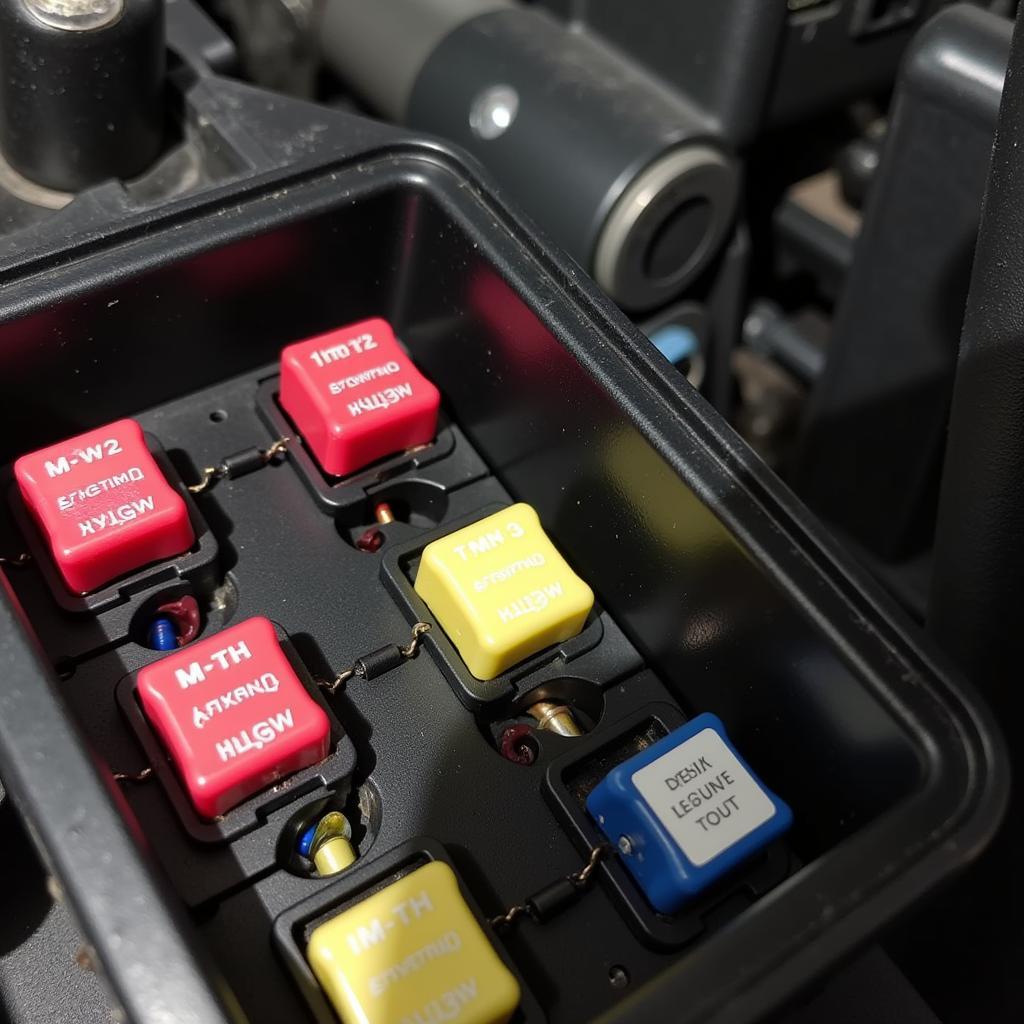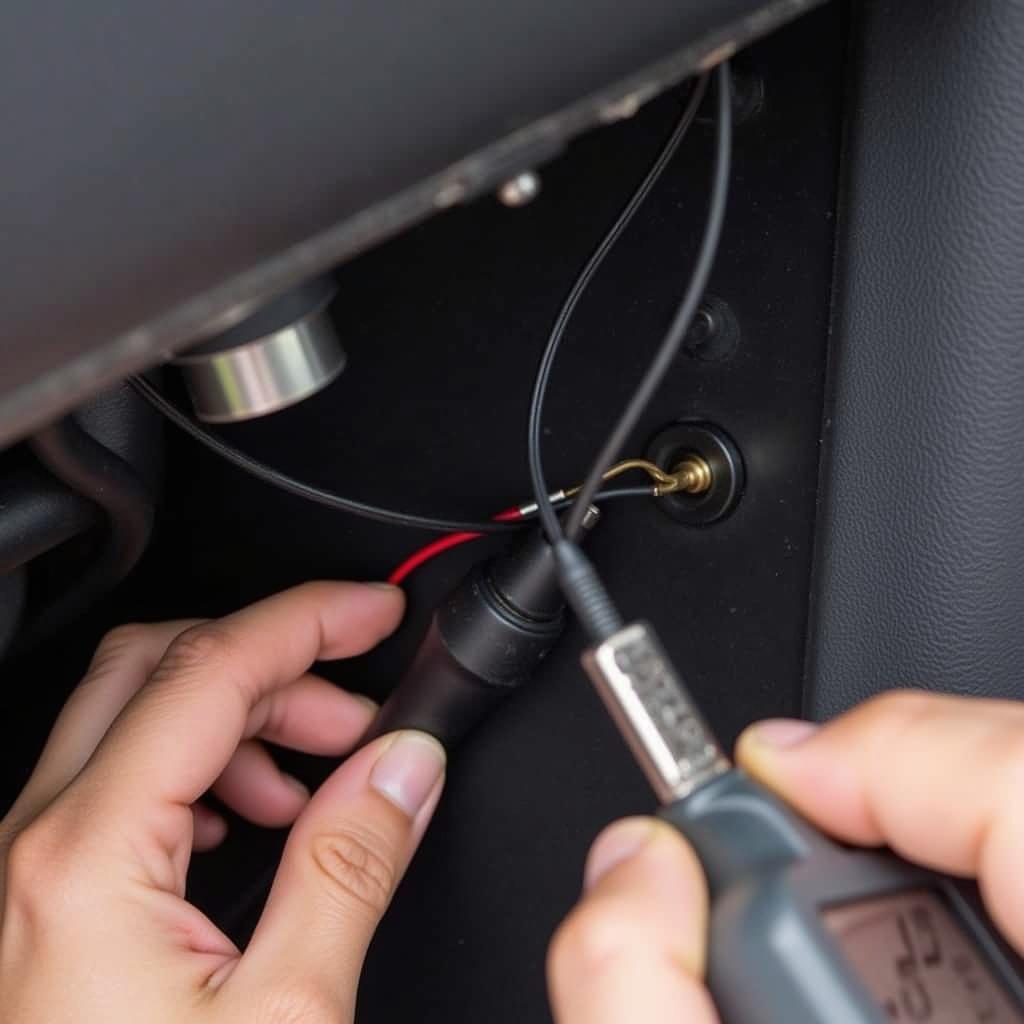Car Amp Problems can be frustrating, turning your enjoyable drive into a silent ordeal. Whether you’re experiencing distorted sound, no sound at all, or intermittent issues, this guide will help you diagnose and potentially fix your car amplifier woes. We’ll explore common causes, troubleshooting steps, and when to seek professional help.
A blown fuse is one of the most common and easily fixable car amplifier problems. Check your car’s fuse box for a blown fuse related to the audio system. If you find one, replace it with a fuse of the same amperage. Sometimes, a seemingly minor issue like a loose ground wire can cause significant problems. After checking the fuse, ensure all wiring connections, especially the ground, are secure. Loose connections can lead to poor performance and even damage your amplifier. Having trouble with your car radio’s amplifier? Check this resource for troubleshooting tips on car radio amplifier problems.
Identifying the Culprit: Common Car Amp Problems
Several factors can contribute to car amp problems. Understanding these potential issues is the first step towards a solution. Here are some of the most common culprits:
- Blown Fuses: As mentioned, this is a frequent issue and often the easiest to fix. Always check your fuses first.
- Wiring Issues: Loose or corroded wires can disrupt the flow of power and signal, leading to a variety of audio problems.
- Grounding Problems: A poor ground connection can cause humming, buzzing, or no sound at all.
- Faulty Head Unit: Sometimes, the problem isn’t with the amplifier itself, but rather with the head unit sending the signal.
- Speaker Problems: A blown speaker can sometimes manifest as an amplifier issue.
- Overheating: Amplifiers can overheat if not properly ventilated. This can lead to damage and malfunction.
- Internal Amplifier Failure: In some cases, the internal components of the amplifier may fail, requiring replacement.
 Blown Fuse in a Car Amplifier
Blown Fuse in a Car Amplifier
Troubleshooting Car Amp Problems: A Step-by-Step Guide
Before you rush to replace your amplifier, try these troubleshooting steps:
- Check the Fuse: Locate the fuse for your car audio system and inspect it for damage. Replace it if necessary.
- Inspect the Wiring: Carefully examine all wiring connections to and from the amplifier. Look for loose connections, corrosion, or damage.
- Verify the Ground Connection: Ensure the amplifier’s ground wire is securely connected to a clean, unpainted metal surface on the car’s chassis.
- Test the Head Unit: Try playing audio from a different source, such as a portable music player, to rule out a faulty head unit.
- Check the Speakers: Test each speaker individually to ensure they are functioning properly.
- Check for Overheating: Feel the amplifier to see if it’s excessively hot. If so, ensure it has adequate ventilation.
When to Seek Professional Help
If you’ve tried these troubleshooting steps and are still experiencing car amp problems, it’s best to consult a qualified car audio technician. They have the expertise and equipment to diagnose and repair more complex issues. For instance, if you suspect internal amplifier failure, a professional can accurately diagnose the problem and advise on repair or replacement. This also applies if you are dealing with other car electrical system issues, such as those affecting the ECU, like the ones described in smart car ecu problems.
“A common mistake people make is assuming the amplifier is the problem when it’s actually a simple wiring issue,” says John Smith, a certified automotive electrician with over 20 years of experience. “Always start with the basics before jumping to conclusions.”
Maintaining Your Car Amplifier
Proper maintenance can help prevent future car amp problems. Keep these tips in mind:
- Keep it Clean: Regularly clean the amplifier and surrounding area to prevent dust and debris buildup.
- Proper Ventilation: Ensure the amplifier has adequate ventilation to prevent overheating.
- Protect from Moisture: Avoid exposing the amplifier to moisture, which can cause corrosion and damage.
- Regular Inspections: Periodically inspect the wiring and connections to catch potential problems early. Experiencing other car issues like exhaust fumes? Refer to this helpful resource on car exhaust fumes problems. Similarly, you can find information on common 15 amp fuse problems in cars for more electrical troubleshooting guidance.
 Checking Car Amplifier Ground Connection
Checking Car Amplifier Ground Connection
Conclusion
Car amp problems can be annoying, but with a little troubleshooting, you can often identify and resolve the issue yourself. By following the steps outlined in this guide, you can save time and money. However, if you’re unsure about any aspect of the process or if the problem persists, don’t hesitate to seek professional help. Contact AutoTipPro at +1 (641) 206-8880 or visit our office at 500 N St Mary’s St, San Antonio, TX 78205, United States for expert assistance.
“Preventive maintenance is key to avoiding car amp problems,” adds Jane Doe, another experienced automotive technician. “Regular inspections and cleaning can go a long way in keeping your audio system running smoothly.”
Have you experienced problems with your car’s springs or dampers? This resource on car and road spring and damper problem constant horizontal speed might help.
FAQ
- What is the most common car amp problem? Blown fuses are often the most common issue.
- How can I tell if my car amp is blown? No sound, distorted sound, or a burning smell can indicate a blown amp.
- How much does it cost to fix a car amp? The cost varies depending on the problem and whether you DIY or hire a professional.
- Can I install a car amp myself? Yes, but it requires some technical knowledge and the right tools.
- How do I prevent my car amp from overheating? Ensure adequate ventilation around the amplifier.
- What should I do if my car amp turns on but no sound comes out? Check the speaker connections and the head unit.
- Why is my car amp making a humming noise? A grounding problem is a common cause of humming.





Leave a Reply